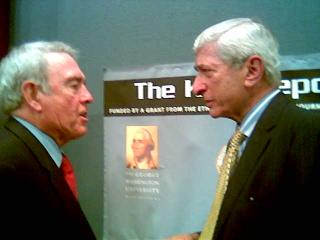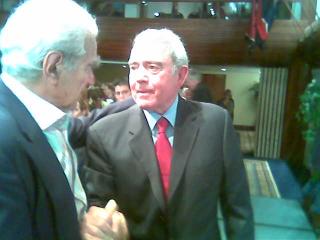 In fact, the close-up I took shows Dan looking like a character out of Dostoevsky.
In fact, the close-up I took shows Dan looking like a character out of Dostoevsky.The evening was strangely painful for me, because I grew up in a CBS household, believing in Edward R. Murrow, Walter Cronkite and the rest of them. When I made my film, I had help from CBS Reports producer Arthur Morse's widow, who arranged for me to view never-broadcast footage in an editing room in the CBS News building on West 57th Street. When I wrote my book about PBS, Morley Safer granted me a telephone interview. I had met 60 Minutes creator Don Hewitt's daughter socially in Washington and thought she was really very nice. Don Hewitt himself once gave me a phone interview. And a cousin of my father's had a CBS station in the Pacific Northwest. Even after Walter Cronkite attacked me in the Wall Street Journal, I still believed that CBS News had some higher standard than other networks. Call it early childhood imprinting.
In any case, the evening reminded me that my childhood beliefs were as unfounded as faith in the Easter Bunny or Tooth Fairy. Marvin Kalb began the whole thing by bringing up Spiro Agnew, a discredited former Nixon administration official, who like Rather, pleaded no lo contendere. I don't think he knew he was being ironic.

Kalb's warmup queries, before he got to the forged document scandal relating to the 60 Minutes II broadcast that didn't end up making any difference in the 2004 election because it was a hoax, were simply weird. Something about defining the difference between a journalist and a member of the media, and asking whether bloggers were members of the media or journalists. What Dan would know about this--or have credibility to discuss--was a mystery before, during, and after the questioning. Dan did say something about not all bloggers being bad, if they put their names and addresses on their blogs, but it was all very odd given that Dan had been caught pulling a fast one and still didn't admit it. If anyone isn't a journalist anymore, it is Dan--though he is obviously a member of the media. OK, maybe he's now a dishonest, unethical, and lousy journalist. Still...
Strangely, some people aren't fleeing from association with Dan Rather, unapologetic about forgeries or not. The event was sponsored by a who's who of establishment worthies in addition to the press club: The George Washington University, the Joan Shorenstein Barone Center for the Press, Politics, and Public Policy of Harvard University, XM Satellite Radio, AM 630 WMAL. It was taped for broadcast by WHUT, Howard University Television, as well as aired live by C-SPAN. The Kalb Report is funded by a grant from the "Ethics and Excellence in Journalism Foundation." I'm not even googling them, because I don't want to barf.
What can one say? Dan Rather obviously doesn't know much about ethics or excellence anymore--if he ever did. His answers to Kalb made clear that Dan believes the forged documents he peddled on 60 Minutes II in 2004 have not been discredited, despite the evidence that has been posted for the world to see on a number of websites--including this one (check our archives).

Dan loyally sticks by his story. He clearly sees himself as a victim of a powerful conspiracy of bloggers and political operatives. Marvin Kalb never pressed him, doing a Larry King type of show. When Dan wouldn't answer a question, he let it go. He praised Dan as a great reporter. He never said he was discredited. From time to time, when Dan gave some sort of Texas b.s. about integrity and speaking truth to power, Kalb would add something like: "I want to associate myself with that statement." So, in a way, Kalb is associating himself with forgery and stonewalling. It reminded me of the Nixon administration: "I am not a crook." Well, I'm sure Nixon believed it as much as Dan and Marvin Kalb. Dan talked a lot about loyalty to his team--four of whom at least lost their jobs because he didn't do his, by checking out his story before broadcast. Dan's still got a job. Producer Mary Mapes, however, doesn't.

Curiously, there weren't too many actual working newsmen and women in the audience. And despite the students papering the room, there were still some empty seats. Perhaps a sign that they had better things to do, or that Dan's seemingly endless victory lap--after the Emmy awards--is wearing a bit thin. One who was there was Bernard Kalb, Marvin's brother. I talked with him afterwards, and asked him what his opinion was about the documents in question. He answered that he believed the Thornburgh report. I told him that I didn't, that anyone could see that the documents in question were obvious fakes by looking at them on the internet. I said I remembered what an IBM Selectric looked like, and asked him if he remembered. He admitted he remembered IBM Selectrics, but maintained that he still believed the Thornburgh report. When I questioned whether he could think for himself, if he had his own conscience, Bernard Kalb clung to his story. He and Dick Thornburgh were in perfect agreement. He would not question a former Republican Attorney General hired by Viacom. (So much for speaking truth to power...)
The audience was mostly George Washington University students, who seemed far too young to remember IBM Selectric typewriters. One of their professors, who apparently was a former CBS News employee from Marvin Kalb's introduction, clearly didn't teach them to ask hard questions of a CBS anchor or 60 Minutes host. To say it was a lovefeast would be an understatement.
The one hard question was seemingly unintentional. Marvin Kalb asked Dan something about his retirement, along with the death of Peter Jennings and retirement of Tom Browkaw, marking "the end of an era." Dan said it wasn't about anchors, it was about the news. He didn't seem to understand that while it is indeed a virtue to speak truth to power, it is not a virtue to speak lies to power.
Dan Rather has damaged his credibility to the point where his unravelling seams begin to show. Frankly, the evening was more than a little embarrassing to watch. It was very, very sad. It really is the end of an era.
UPDATE: More here from RadioBlogger. He calls Marvin Kalb and Dan Rather's conversation "elder abuse." (ht lgf) And even more from The New York Post. (ht Best of the Web)